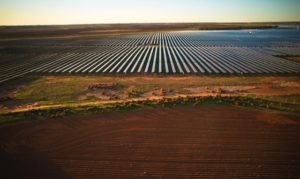
Simon Hackett, the internet entrepreneur and now battery storage investor and multiple electric vehicle owner, says Australia needs to act soon to ensure the country does not get further left behind in the uptake of electric vehicles.
Hackett, the largest shareholder in Australian battery storage manufacturer Redflow, says Australia is already trailing the rest of the world, and will continue to do so if the government does not act.
“Australia is the only first world country that I can find that has almost no incentives for EV take-up, so surprise, surprise, we are lagging in it,” Hackett tells Reneweconomy in an interview on its Energy Insiders Podcast, on the sidelines of last week’s Energy Storage Conference.
“We will absolutely catch up …. but we will be years later than other markets because our governments have not had enough vision to see the merits of promoting their take-up.”
Hackett’s frustration with policy extends to storage in households, as well as vehicles. And for that he blames a political obsession with fossil fuels.
“We are still depressingly near the era when politicans walked into parliament brandishing lumps of coal, as if it were a good thing,” he says.
And while some have now moved beyond that, we “need to go past the idiocy, through doing nothing, to doing something. We are two thirds of out way down that path. Let’s do something!”
So, what should be done?
“Do the boring thing,” Hackett says. “Look at what works in other countries, copy it, and then pretend you thought of it.”
For Australia, that could include borrowing from California and providing tax incentives for EVs. Most experts insist that once interest is created in the market, then prices will fall quickly, just as they did with rooftop solar, and will do with household storage.
But this leads us to Hackett’s other major gripe – the continued existence of premium feed in tariff for hundreds and thousands of households in states such as Queensland, South Australia and Victoria, some of which will continue for another decade.
Hackett repeats his call that the “value” of these premium FiTs should be traded in. Instead of having a $50,000 liability on their books, governments could offer half that now, and buy the household a battery.
Without that, excessively generous solar FiTs act as a distortion, and actively discourage such households from investing in household storage, because they have no incentive to do so. Quite the opposite, in fact.
“It’s nutty,” he says. “I know it is politically difficult –but I am still surprise it is not happening, he says.
Hackett says it should be clear to everyone (sadly, it’s not clear to all) but new coal fired power stations will not be built, so storage should be encouraged – at small scale and large scale.
“Like EVs, it is going to happen away – it’s the pace that it going to depend on the propensity of governments to accept that there is merit in accelerating that transition.”
In the meantime, on EVs, Australian consumers have little choice, and about the only option is a Tesla. Hackett has a handful, including an original Tesla Roadster, a Model S and Model X.
“Here in Australia it is to Tesla’s enormous credit that they bothered and they are out here at all. I am a huge and happy customer of Tesla EVs,” he says.
And even though Redflow’s zinc bromide “flow” batteries are in direct competition with Tesla Powerwalls, Hackett says he believes Tesla EVs “are an awesome and appropriate use of lithium.”
Hear the interview with Hackett, including his discussion of Redflow’s opportunities in the battery storage sector, in this week’s episode of our Energy Insiders podcast, which also features an interview with new South Australia energy minister Dan van Holst Pellekaan.










